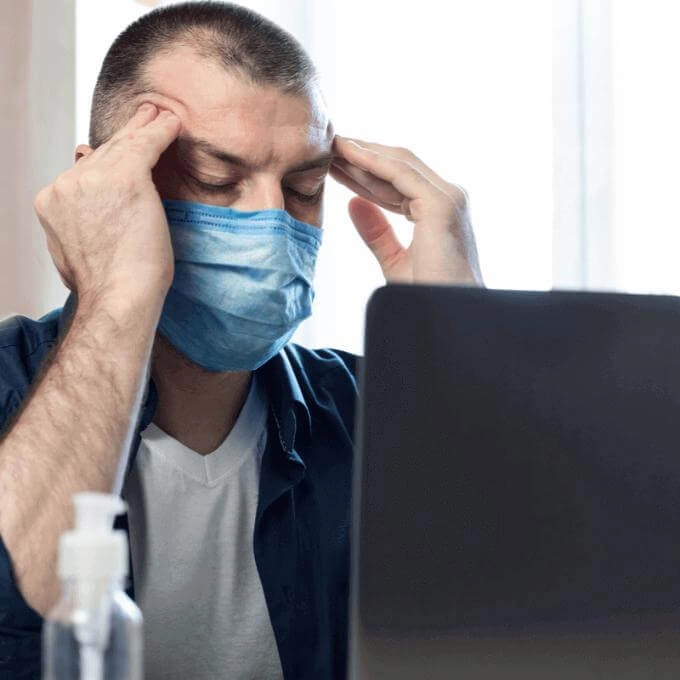Home/Wellness Zone/Sakra Blogs
4th Nov, 2020

As the Covid-19 pandemic continues to spread and show its implications in our community, it is normal for people to experience a wide range of thoughts, feelings, and display reactions.
Especially those who get admitted in the hospital have a very high tendency to displaying such behaviour.
Given below are the common experiences of people, in the current situation:
Feeling stressed or overwhelmed
Anticipatory worries related to a health condition and imagining the worst-case scenario
Anxiety, worry, or fear
Racing thoughts
Sadness and loss of interest in activities
Increased heart rate and stomach upset, fatigue, or other uncomfortable sensations
Frustration, irritability, or anger
Restlessness or agitation
Feeling helpless
Difficulty concentrating or sleeping
Feeling disconnected from others
Apprehension about going to public spaces
Trouble relaxing
These feelings are all understandable in the face of this significant challenge. Looking after our wellbeing in times like this can help us reduce stress, and is crucial to take calm and effective action in the midst of this global crisis.
Things you can do to cope with stress, anxiety or distress
When most things feel uncertain or out of our control, one of the most effective ways to manage stress and anxiety is by focusing on the actions that are in our control.
Here are some ways to look after your physical and emotional wellbeing during this challenging period:
Keep things in perspective: In a situation that’s uncertain, it’s natural to have many ‘what if?’ questions in our minds. In the absence of proper information or having incomplete information, our anxious mind starts thinking about worst-case scenarios, which can leave us feeling overwhelmed, helpless, or vulnerable.
Here are some questions you can ask yourself to shift your thinking from an awful mind frame to a more helpful mindset:
What are the things within my control?
Am I overthinking about the likelihood of the worst-case scenario?
What strategies have helped me in coping with challenging situations in the past that will serve me well during this time?
What are the positive actions that I can take now?
Maintain your day-to-day activities. Practice self-care as much as possible:
During these unprecedented times, it's natural for our minds to think of all the usual activities we may not be able to do at the moment. Make a conscious shift to focus on the activities we are still able to do or those that we may have more opportunity to do if we're hospitalized.
Some activities that you could do include:
Getting up at the regular time
Carrying out your daily routine
Reading a book
Listening to a podcast
Trying out a new skill
Learning something new, like a new language
Coming up with thoughts or ideas
Practice self-care:
Look after yourself to encourage the positive frame of mind.
Everybody practices self-care differently. Here are some common examples:
Maintaining good social connections and communicating openly with family and friends
Making time for activities and hobbies you enjoy
Maintaining a healthy lifestyle by eating a balanced diet, exercising regularly, getting quality sleep, and avoiding the use of alcohol, tobacco and other drugs to cope with stress
Relaxing your mind through meditation or other mind relaxing activities
Remember that physical distancing doesn’t mean not connecting socially:
You can make use of technology to stay connected, and both give and receive support, remotely. You could:
Call, text, or have a video call with friends and family
Share quick and easy recipes
Start a virtual book or movie club
Schedule a workout together over video chat
Join an online group or peer forum
When we are stressed, naturally things appear worse than they really are. Instead of thinking about the worst-case scenario and worrying about it, ask yourself:
Am I thinking a lot, assuming something bad will happen when I really don’t know the outcome?
Remind yourself of the facts and that the actual number of confirmed cases of and deaths related to coronavirus is low.
2. Am I catastrophizing how bad the consequences will be?
Remember, weakness due to Coronavirus infection is usually mild and most people recover without needing specialized treatment.
3.Am I underestimating my ability to cope?
Remind yourself of what you have done to cope with extremely stressful situations in the past. Also, thinking about how you would cope if the worst were to happen, can sometimes help you put things into perspective.
Looking after your mental health, during self-isolation:
Video calling is amazing. The best way to connect with your near ones.
There are lots of free apps that’ll help you improve your breathing technique and meditation skills. Make use of these apps.
You can manage your anxiety using creativity. Just get back to painting, drawing, writing, crafting, etc.
Take a break from the news. Read a book or take out your old collections. You can access lots of books online, as well.
Plan your day. Write down how you want to spend your day.
Feel productive. Make a list of things you said you’d do but never managed to do. And do it.
Play online games with friends and family members.
Sing in the shower even if you’re not a singer, its super therapeutic.
Reach out for help:
If your situation is really difficult, please don’t hesitate, just reach out to us. At Sakra World Hospital, our team of experts will help you resolve your mental health concerns, swiftly and efficiently.
Enquire Now
